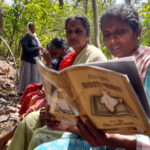In Rajasthan’s last village on the India-Pakistan border, many of the elderly residents have a last wish: meeting their Pakistani relatives they haven’t seen in years.
Man-made borders, which are now heavily patrolled by security forces and marked by high fences, have stood in the way of family reunions.
Sadly, relatives separated by the international border aren’t far from each other.
Tanot, for that matter, is just 20km away from the Pakistan border. The distance could be even less as the crow flies.
However, the short distance – courtesy official procedures and protocols – have proven to be too wide for the relatives on either side to bridge.
Separated by the India-Pakistan border
In the absence of physical meetings, their longings to meet up have intensified.
“All I wish is to meet my relatives once. But then, my unfulfilled wish is only getting old with me,” lamented Tiba Devi, 60, a resident of Tanot.
A speck of a village in the expansive deserts of Rajasthan, Tanot is 115km away from the district headquarters of Jaisalmer. In it resides some 600 people in about 80 houses, all echoing with sighs over the forced separations.

Before Pakistan came into being, the residents of the region lived together. Though largely poor, nothing stopped them from sharing their joys and sorrows with their loved ones.
Then came the partition, followed by the fences and the strict border rules. With them vanished the family get-togethers – pleasures that are immeasurable in their otherwise dreary lives.
No visas to visit relatives in Pakistan
Trapped on either side, relatives struggle to keep updated about their loved and dear ones on the other side.
“They [my relatives] live in Pakistan. I had this information that the son of my sister-in-law died earlier this year. I wanted to meet him, but could not,” regretted Tiba Devi.
It is not that she did not try. According to her, she had applied for a visa to visit Pakistan some 10 years ago.
“I sat under the Delhi flyovers for three days, hoping to get the permission. It has been years now and I am still waiting,” she said.
Her disappointment is shared by many in Tanot.

Imna is 70 and a neighbour of Tiba. She also had travelled to Delhi to get a visa. But it was not granted.
Three others – Uda Ram, 50, Tiba’s son Om Prakash, 40, and Imna’s son Topu Ram, 35, have also been waiting since long for permission to pay a visit to Pakistan.
“I can only blame my fate that I cannot meet my brothers,” rued Imna.
She had settled down in Tanot, leaving her seven brothers back at what was their home in undivided India. But when the border fences came up, the journey back home was no longer possible.
So close, yet so far
Though separated by only a few kilometres, Tanot residents are victims of the tyranny of distance.
Why the residents of Tanot are routinely denied visas remain a mystery.
An email sent by Village Square to the Pakistani embassy has not got a reply yet. This story will be updated with the response once received.
For that matter, even letters from Pakistan do not reach the village.

“I do not even wait for any such thing from the other side,” admitted Teja Ram, the postman of Tanot’s only post office.
“Only parcels of the Border Security Force (BSF) and money orders for the Mata Mandir come here,” Deva Ram, the postmaster said.
‘Protected’ by the local deity
Though far-flung, the temple – Sri Mateshwari Tanot Rai Mandir – is famous countrywide, attracting pilgrims from far and wide.
Amit Shah, India’s home minister, visited it twice in a gap of one year.
Local folklore has it that the temple deity is all-powerful and was in the line of duty during the 1965 war with Pakistan, protecting Indian soldiers. Some 3,000 shells were reportedly dropped in and around Tanot then, but both the village and the soldiers survived relatively unscathed.
The temple survived a similar aerial bombardment too during the 1971 war.
The government has now approved more than Rs 17 crores for redeveloping the temple complex, complete with waiting rooms, an amphitheatre and other amenities.
A wait for unhindered visits
Villagers are hopeful that that development work will make their life better as well.
“Through the development work, I think water shall be made easily accessible,” Usha Devi, 30 said. For the time being, there is no running water in homes of Tanot, and women are forced to queue up several times a day at the common pump house for collecting water.
Life is expectedly harsh in Rajasthan’s last village. But there is a sense of pride as well.
“Don’t call it the last village. In fact, it is the first village of India,” Topu Ram said.
As a proud resident of India’s ‘first village’, Topu Ram waits patiently for his first meeting in decades with his separated relatives in Pakistan.
Waiting too are the others in Tanot – Tiba Devi included.
“Now I wish to go where no wire or border would hinder our actual meeting,” Tiba Devi said.
With age gradually withering her down, her forlorn gaze at the distant stars is laden with the deep longing to meet her relatives.
The lead image shows Tanot village, where people are unable to meet their family members in Pakistan (Photo by Amir Malik)
Amir Malik is a freelance journalist based in Bihar. He writes about health, women and children and their interaction with nature. He is a Rural Media Fellow 2022 at Youth Hub, Village Square.








